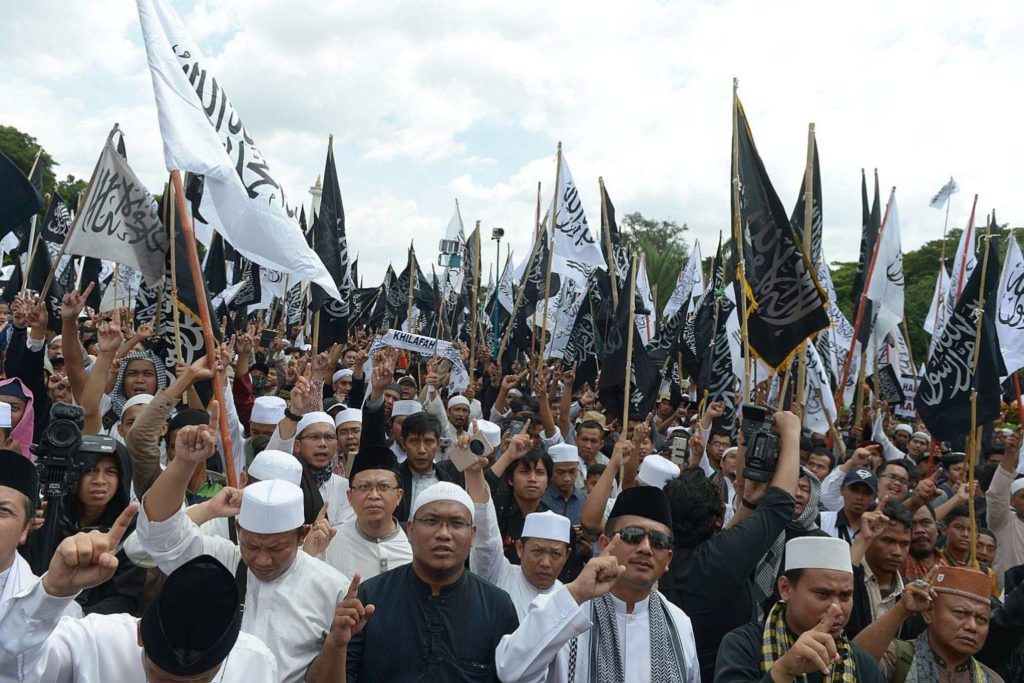Australia/Israel Review
Asia Watch: Irregular regulation
Aug 7, 2017 | Michael Shannon

Michael Shannon
In signing a government regulation in lieu of law (Perppu) that gave the state power to officially ban Hizb ut-Tahrir Indonesia (HTI), Indonesian President Joko “Jokowi” Widodo has made a bold and politically risky move to counter the rise of Islamist groups that spearheaded the political and legal downfall of Jokowi’s protégé, former Jakarta Governor Basuki “Ahok” Tjahaja Purnama.
HTI is the local chapter of the international Hizb ut-Tahrir organisation, which professes the goal of establishing a non-democratic, pan-Islamic theocracy in the Muslim world, albeit through avowedly peaceful means. It has been present in Indonesia since the 1980s but has taken a higher profile in the post-Suharto era, largely as a campus-based movement with well-attended meetings and rallies.
The Perppu broadened the Ministry of Justice and Human Rights’ powers to disband groups that espouse ideologies contradictory to pluralistic values enshrined in the state ideology Pancasila, previously outlined in the 2013 Law on Mass Organisations.
“The existing law is not sufficient enough to prevent the spread of radical ideologies that contradict Pancasila and the 1945 Constitution,” Chief Security Minister Wiranto explained in a press conference.
High level government officials, including Wiranto himself, have repeatedly complained about what they said were “lengthy and complicated” procedures stipulated under existing law to ban HTI – requiring the government to seek a court ruling to ban aberrant organisations, which could take years. The new regulation is aimed to end legal uncertainties over that process and to help the government tackle similar extremist groups in the future.
The decree adds that civil organisations are “not allowed to carry out activities that are the responsibility of law enforcement officials”, in a reference to Islamist vigilante and anti-vice groups with an ugly history of harassing minorities, notably the infamous Islamic Defenders Front (FPI).
Unsurprisingly, the move has sharply divided opinion. Many support its political goal of curtailing the destabilising excesses of Islamist movements, but there is concern at the precedent set by the short-circuiting of judicial process.
Jokowi prepared the ground before his move, liaising with and enlisting the support of the two largest Muslim organisations in the country – Nahdlatul Ulama (NU) and Muhammadiyah – as well as several smaller organisations, including the Islamic Union (Persis), Association of Indonesian Chinese Muslims, Islamic Preachers Association, Syariakat Islam Indonesia, Union of Islamic Education and Board of Da’wah Islamiyah Indonesia.
Robikin Emhas, NU’s head of law affairs, described the president’s move as “clever and inspiring. It is accurate and constitutional,” and the spread of hardline Islamist groups in the country as, “Like a cancer cell, the rate of spreading is so rapid; so proper and prompt treatment is required, including through the legal approach.”
Meanwhile, HTI has condemned the move as “despotic”, saying it removes protections for mass organisations from government efforts to disbland them on weak legal grounds. “When that law is revised, including revoking the trial mechanism, it’s obvious the government is making an arbitrary move,” spokesman Ismail Yusanto told the Jakarta Globe.
The group now plans to file a judicial review against the new regulation with the Constitutional Court.
A Jakarta Post editorial described the regulation as “a slippery slope” given the government’s power to expand the definition of anti-Pancasila ideologies; argued that “once the government is in possession of a hammer, it will treat everything as if it were a nail;” and that “the government may have good intentions in banning HTI, but the means do not justify the ends [sic].”
Australian National University’s Greg Fealy wrote in The Interpreter blog that, “The government’s justification for the Perppu is indeed unconvincing and points to both haste and poor planning.” He added that the evidence against HTI may have been insufficient to win judicial approval of a ban under the existing law, and that if HTI’s appeal to the Constitutional Court is upheld or the parliament does not ratify a new law, “Jokowi’s standing will be diminished and Islamist groups emboldened.”
While HTI’s aspiration for a global caliphate clearly contradicts the country’s founding principles, and its leaders have consistently argued the democratic system is not consistent with Islamic teachings, it was only one of several organisations that headed the anti-Ahok campaign and its record of non-violence arguably made it a softer target.
The backdrop is an ongoing rivalry that dates back to the late Suharto era, between former military strongman Prabowo Subianto and a secular faction of the military called the “red-and-white” faction, which backs Jokowi.
Having defeated Prabowo for the presidency in 2014 and likely facing a rematch in 2019, the Jokowi camp’s long-term strategy would almost certainly include defanging the Islamist attack-dog that Prabowo openly backed against Ahok with such devastating effect.






